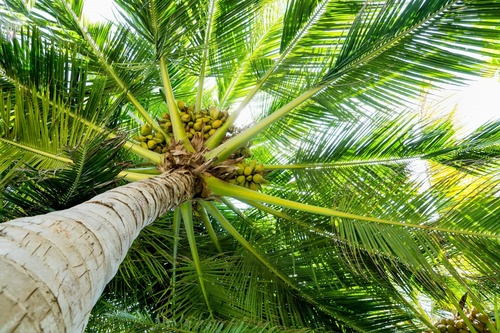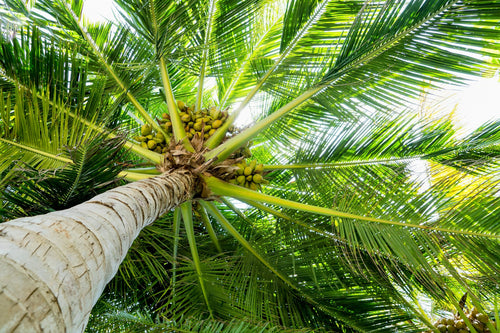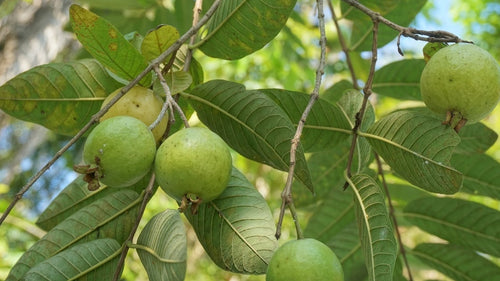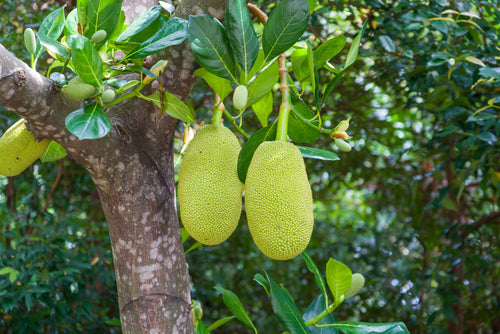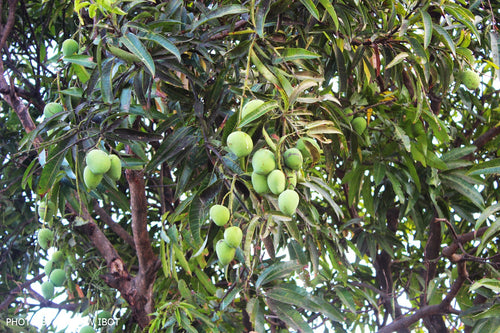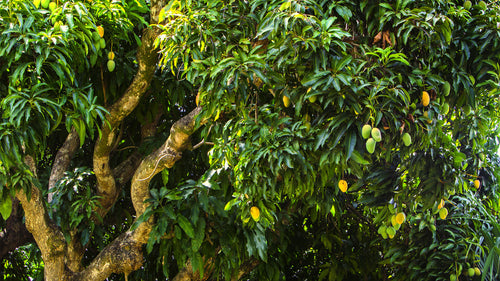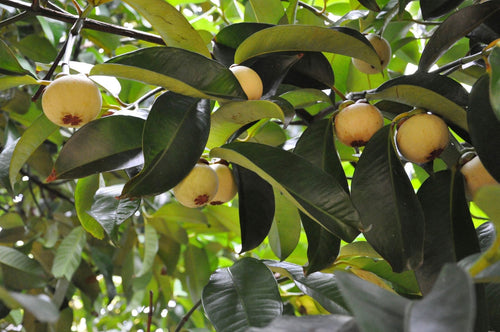Green by Name, Sustainable by Action: Deloitte Trees for Employees and the Planet
Deloitte has taken a significant step towards environmental sustainability with its tree plantation initiative under the agroforest concept. This init Read more
Digital Forest
Forest with 33 Trees planned
Want to plant your tree now?
Plant a Tree @ 299Green by Name, Sustainable by Action: Deloitte Trees for Employees and the Planet
Deloitte has taken a significant step towards environmental sustainability with its tree plantation initiative under the agroforest concept. This initiative underscores Deloitte's commitment to combating climate change and fostering sustainable development. As part of the program, trees were planted in agroforestry landscapes, blending ecological restoration with community upliftment.
What makes this initiative truly unique is the personal touch Deloitte added by planting trees in the name of its employees. This thoughtful gesture not only honors their contributions but also creates a deeper connection between the workforce and environmental responsibility. By integrating agroforestry, Deloitte supports biodiversity, enhances soil fertility, and contributes to carbon sequestration, all while empowering local farmers and communities with sustainable livelihoods.
This initiative aligns with Deloitte's broader vision of making a meaningful impact that goes beyond business, fostering a greener planet for future generations. It serves as an inspiring example of how corporations can integrate environmental sustainability into their core values while creating lasting environmental and social benefits.
Tree Plantation Date
9th May 2024
Plantation Location
Sahayadri Van, Girvi, Satara, Maharashtra 415523
Trees Planted
Total Count: 33 Trees
Species Name: Mango, Guava, Chiku, Jackfruit, Coconut
Forest Type: Agroforest
Agroforestry is a sustainable land-use practice that integrates trees with crops and livestock, providing numerous benefits for farmers while enhancing environmental health. For farmers, agroforestry improves soil fertility, reduces erosion, and diversifies income through timber, fruits, and other tree-based products, ensuring economic stability even during adverse climatic conditions. It also promotes biodiversity and offers natural shade and windbreaks, increasing agricultural productivity. Deloitte embraced this farmer-centric approach with its tree plantation initiative under the agroforest concept, planting trees in the name of employees to foster environmental sustainability. By adopting agroforestry, Deloitte not only supported local farmers but also contributed to combating climate change through carbon sequestration, soil restoration, and reforestation, making a positive impact on both livelihoods and the planet.
Advantages Of Agroforest
Enhanced Income Diversification
Agroforestry provides farmers with multiple streams of income by integrating trees, crops, and livestock on the same land. Trees produce valuable products like timber, fruits, nuts, and medicinal plants, offering additional revenue sources beyond traditional farming. This diversification reduces dependency on a single crop, ensuring stable incomes even during market fluctuations.
Improved Livelihood Resilience
The agroforest system enhances farmers' resilience to climate change and environmental challenges. Trees act as natural windbreakers and provide shade, protecting crops and livestock from extreme weather conditions. Additionally, the multi-layered planting approach improves land productivity, ensuring steady yields even in adverse conditions.
Reduced Farming Costs
Agroforestry lowers farming expenses by reducing the need for synthetic fertilizers and pesticides. Trees improve soil fertility through natural nutrient cycling and nitrogen fixation, while their canopy minimizes water evaporation and suppresses weed growth, cutting down irrigation and herbicide costs.
Employment Generation for Rural Communities
Agroforestry creates year-round job opportunities, such as tree planting, maintenance, and harvesting of tree-based products. This promotes rural employment, empowering local communities and improving their quality of life.
Enhanced Soil Fertility and Erosion Control
Trees in agroforests improve soil structure, add organic matter, and enhance water retention capacity. Their roots stabilize the soil, preventing erosion and maintaining land productivity over the long term.
Carbon Sequestration and Climate Mitigation
Agroforests play a vital role in combating climate change by absorbing and storing carbon dioxide from the atmosphere. By creating a balance between agricultural productivity and environmental restoration, agroforestry contributes to global climate goals.
Biodiversity Conservation
Agroforestry systems support a diverse range of plant and animal species by creating habitats for birds, insects, and other wildlife. This biodiversity not only benefits ecosystems but also enhances pollination and pest control for nearby crops.
Water Resource Management
Tree roots in agroforests enhance groundwater recharge and reduce water runoff, improving water availability in farming regions. This sustainable practice ensures efficient use of water resources for both agriculture and the surrounding environment.
Activities During Tree Plantation
During Deloitte’s tree plantation initiative, farmers planted selected saplings as part of the agroforest concept, ensuring sustainable and efficient execution. They began by preparing the land through plowing and enriching the soil with organic matter to create a nutrient-rich base. The farmers carefully planted saplings chosen for their suitability to the local environment and their ability to complement existing crops. Each sapling was strategically placed to enhance soil fertility, provide shade, and conserve water followed by consistent care through watering and monitoring. By planting and nurturing these trees, the farmers not only supported Deloitte’s commitment to environmental sustainability but also strengthened their own livelihoods through sustainable agroforestry practices.
Tree Plantation Purpose
SDGs Achieved Through Deloitte’s Agroforest Tree Plantation Initiative
1. SDG 1: No Poverty
Agroforestry creates multiple income opportunities for farmers by integrating trees with crops and livestock. The trees produce economically valuable products like timber, fruits, nuts, and medicinal plants, which supplement farmers’ incomes throughout the year. Additionally, the initiative generates employment in tree planting, maintenance, and harvesting, reducing rural poverty and improving the financial stability of farming communities. This diversified approach helps small-scale farmers build resilience against market fluctuations and unforeseen economic challenges.
2. SDG 2: Zero Hunger
The agroforest system supports sustainable food production by enhancing soil fertility and protecting crops through natural shade and windbreaks. This results in improved agricultural yields without relying on expensive chemical inputs. The trees also provide edible products, such as fruits and nuts, contributing to better nutrition and food security for farming households and nearby communities. Furthermore, the enhanced ecosystem ensures long-term productivity of farmland, which is critical for feeding growing populations.
3. SDG 3: Good Health and Well-Being
By improving air quality, agroforestry systems promote better respiratory health for communities. Trees absorb pollutants, release oxygen, and reduce particulate matter in the atmosphere. The initiative also supports the production of nutritious food resources like fruits and medicinal plants, which improve dietary health and well-being. In addition, the reduced use of chemical fertilizers and pesticides leads to healthier soil and water, benefiting both farmers and the surrounding population.
4. SDG 5: Gender Equality
Deloitte’s agroforest initiative indirectly supports gender equality by involving women in plantation and maintenance activities, providing them with additional income-generating opportunities. Women in rural areas are often primary caregivers and food providers; agroforestry empowers them economically and socially by increasing their involvement in sustainable development activities. This enhanced participation contributes to closing the gender gap in rural economies.
5. SDG 6: Clean Water and Sanitation
Agroforestry improves water resource management by reducing surface runoff, filtering pollutants, and enhancing groundwater recharge through deep-rooted trees. Tree canopies reduce water evaporation from the soil, ensuring better moisture retention for crops. These practices help sustain water availability and maintain water quality, supporting both farming needs and the broader community’s access to clean water.
6. SDG 8: Decent Work and Economic Growth
The initiative promotes sustainable economic growth by creating employment opportunities for farmers and rural workers in activities such as tree planting, sapling care, pruning, and harvesting. It fosters decent work conditions by emphasizing environmentally responsible and community-friendly practices. Additionally, the trees provide raw materials for industries such as construction, food processing, and pharmaceuticals, contributing to local and regional economic growth.
7. SDG 10: Reduced Inequalities
The initiative empowers marginalized farming communities by providing them access to sustainable livelihood opportunities and resources. By integrating small-scale farmers into the agroforestry system, the program helps bridge the socio-economic gap between rural and urban populations. The emphasis on local knowledge and participation ensures equitable growth and reduces disparities in income and opportunities.
8. SDG 12: Responsible Consumption and Production
Agroforestry promotes environmentally sustainable production systems by reducing the reliance on chemical inputs. The integration of trees enhances soil fertility and pest control naturally, reducing the need for synthetic fertilizers and pesticides. The system encourages efficient use of land and water resources, resulting in sustainable agricultural and forestry outputs that minimize environmental harm.
9. SDG 13: Climate Action
Trees in agroforests play a critical role in combating climate change by absorbing and storing carbon dioxide, acting as significant carbon sinks. By mitigating greenhouse gas emissions and promoting carbon sequestration, the initiative supports global climate action goals. Additionally, agroforestry systems help farmers adapt to changing climate conditions by improving land productivity, reducing the impact of extreme weather events, and stabilizing microclimates.
10. SDG 15: Life on Land
Agroforestry enhances biodiversity by creating habitats for various species of plants, animals, and insects. It helps restore degraded land, combat deforestation, and prevent soil erosion. The integration of native and diverse tree species ensures ecological balance and promotes the sustainable use of terrestrial ecosystems. By supporting healthy soils and ecosystems, the initiative contributes to long-term environmental sustainability.
11. SDG 17: Partnerships for the Goals
Deloitte’s partnership with Grow Billion Trees has played a pivotal role in achieving the SDG of "Partnerships for the Goals" by combining corporate expertise with grassroots efforts to address environmental sustainability. Through this collaboration, Deloitte has been able to scale its tree plantation initiatives, leveraging Grow Billion Trees' extensive network and deep understanding of agroforestry practices. The partnership has facilitated the widespread planting of trees, supported sustainable land use practices, and empowered local farmers through training and resources. By aligning their efforts, both organizations have demonstrated the power of cross-sector partnerships to drive meaningful environmental impact, enhance biodiversity, and contribute to the global fight against climate change. This initiative not only strengthens Deloitte's commitment to sustainability but also exemplifies how collaboration can amplify the achievement of shared global goals.
ESGs Achieved Through Agroforestry
Environmental (E)
Deloitte’s tree plantation initiative in the agroforest concept significantly contributes to environmental sustainability by enhancing biodiversity, improving soil health, and promoting carbon sequestration. The integration of trees with agricultural systems helps restore degraded land, prevent soil erosion, and increase soil fertility, reducing the need for chemical fertilizers. The trees act as natural barriers, providing shade and conserving water, which improves the resilience of ecosystems against climate change. Moreover, the initiative helps mitigate the effects of deforestation and promotes the conservation of natural resources, ensuring long-term environmental stability. This environmental stewardship aligns with global sustainability goals and demonstrates Deloitte’s commitment to minimizing its environmental footprint.
Social (S)
The social impact of Deloitte’s agroforest tree plantation initiative is equally profound. By involving local farmers in the planting and maintenance processes, the initiative creates new economic opportunities, enhances livelihoods, and empowers communities. Farmers benefit from diversified income streams, as they can harvest fruits, timber, and other tree-based products, which increases their economic resilience. Additionally, the initiative promotes community engagement and provides a platform for education and knowledge-sharing about sustainable farming practices. Through these efforts, Deloitte fosters a positive social impact, helping to reduce poverty, improve food security, and promote gender equality by empowering both men and women in rural areas.
Governance (G)
From a governance perspective, Deloitte’s tree plantation initiative reflects strong corporate responsibility and ethical leadership. The partnership with Grow Billion Trees exemplifies transparency, accountability, and effective collaboration between the corporate and grassroots levels. Deloitte ensures that the tree plantation process is conducted in a sustainable manner, with proper monitoring and reporting mechanisms in place to track progress and impact. The initiative adheres to the highest environmental and social standards, promoting responsible practices across its supply chain and partnerships. Through its focus on governance, Deloitte demonstrates how businesses can integrate sustainability into their core operations, reinforcing trust among stakeholders and contributing to the broader ESG objectives.
Commitment by Grow Billion Trees
Grow Billion Trees is committed to driving sustainable plantation efforts, ensuring every initiative aligns with key environmental objectives and promotes long-term ecological balance. We focus on selecting native tree species that are well-adapted to local ecosystems, ensuring a higher survival rate and stronger environmental impact.
To maintain plant health and longevity, Grow Billion Trees emphasizes continuous maintenance and regular monitoring of the plantations. This approach helps ensure that each tree thrives, contributing effectively to both biodiversity and climate resilience.
Transparency is a core principle in our operations. Clients receive comprehensive reports, including geo-tagging of planted trees, survival rate updates, and ongoing progress reports. This level of openness allows clients to track the direct impact of their contributions, reinforcing trust and accountability.
Through our dedication to sustainable practices, Grow Billion Trees ensures that every plantation project leaves a lasting positive footprint on both the environment and the local communities it serves.
Summary
Deloitte’s tree plantation initiative in the agroforest concept focuses on environmental sustainability by planting trees in the name of its employees. This initiative integrates trees with agricultural practices to enhance biodiversity, improve soil fertility, and promote carbon sequestration. The trees are planted in rural areas by farmers, creating additional income streams through timber, fruits, and other tree-based products, which strengthens their livelihoods and supports sustainable farming practices. Through this effort, Deloitte contributes to mitigating climate change, restoring degraded land, and promoting responsible land use. The initiative also empowers communities by creating new economic opportunities and fostering a culture of sustainability. By aligning with sustainable development goals, Deloitte’s agroforest tree plantation initiative demonstrates the power of corporate responsibility in driving long-term environmental and social benefits.
Trees for Corporates
Trending
Most Popular
1. Corporate Sustainability and Tree Plantation
Corporate sustainability isn't just a buzzword; it's a responsibility that companies like Deloitte take seriously, especially with their tree plantation initiative. By planting trees through the agroforest model, Deloitte aligns its business strategies with long-term environmental goals. This commitment isn't just about ticking boxes on a corporate report card—it's about nurturing the earth and ensuring that future generations inherit a healthier planet. When Deloitte plants trees in the name of its employees, it's not just creating a green legacy; it's also making a real impact on local communities and ecosystems. The trees serve multiple purposes, from providing economic benefits to farmers to improving soil quality and carbon sequestration. So, if you thought corporate sustainability was all about office recycling bins, think again—Deloitte's tree plantation initiative is proof that businesses can play a significant role in the planet's well-being.
2. Agroforestry Benefits for Rural Communities
Agroforestry isn’t just a fancy term for mixing trees with crops—it's a game-changer for rural communities. For farmers, it’s like getting a multi-tool for their land. The addition of trees can boost soil health, prevent erosion, and increase crop yields, while providing additional income streams. And don’t forget the fruits, timber, and other products that come with those trees—money doesn’t grow on trees, but it certainly can come from them! Deloitte’s tree plantation initiative, focusing on the agroforest concept, is a prime example of how businesses can help empower rural populations. By planting trees in farmers’ names, Deloitte helps diversify incomes and promotes sustainable agricultural practices. So, whether it's improving livelihoods or supporting the environment, agroforestry packs a punch for both the land and the community.
3. Carbon Sequestration through Agroforestry
every tree planted is a small victory for the planet—and a big one for the farmers who benefit from the agroforestry system. Go ahead, give Mother Nature a high-five!
4. Sustainable Development Goals (SDGs) and Tree Plantation
Deloitte's tree plantation initiative is more than just greenwashing—it’s a direct step toward achieving the United Nations Sustainable Development Goals (SDGs). By planting trees under the agroforest model, Deloitte is addressing a multitude of SDGs, including "No Poverty," "Zero Hunger," and "Climate Action." Each tree planted by the company and its farmers contributes to carbon sequestration, improved agricultural yields, and enhanced biodiversity. This isn’t just about corporate goodwill—it’s about driving systemic change that benefits people and the planet. So when you think SDGs, think of Deloitte’s initiative as a perfect example of how business can align with global sustainability objectives. It's not just planting trees; it's planting the seeds for a more sustainable future.
5. Tree Plantation for Environmental Sustainability
Tree plantation initiatives like Deloitte’s in the agroforest concept play a vital role in environmental sustainability. Not only do trees beautify landscapes, but they also protect soil, conserve water, and promote biodiversity. By planting trees as part of a well-managed agroforestry system, Deloitte ensures that the impact goes far beyond just aesthetics. It’s about creating ecosystems that thrive, improving air quality, and restoring balance to nature. The benefits are twofold—farmers gain from the agricultural benefits, and the environment gets a much-needed boost. So, let’s face it—when companies like Deloitte invest in tree plantations, it’s the environment that wins the most!
6. Employee Engagement through Tree Plantation
Who knew that tree planting could be the ultimate team-building activity? Deloitte’s tree plantation initiative, where trees are planted in the names of employees, creates a unique sense of pride and engagement among staff. Instead of just signing a check for a charity, employees get to see the tangible impact of their company’s sustainability efforts. Every sapling planted is a reminder of their role in shaping a greener future. Plus, it adds a personal touch to corporate social responsibility initiatives. Employee engagement isn't just about having a free lunch at work—sometimes it’s about going outside, getting your hands dirty, and knowing you're part of something bigger.
7. Biodiversity Enhancement through Agroforestry
Agroforestry doesn’t just boost crops—it’s a biodiversity powerhouse. When you plant trees, you're creating a habitat for countless species of flora and fauna. This is exactly what Deloitte’s agroforest tree plantation initiative achieves. By planting trees and promoting biodiversity, they’re not only helping farmers but also supporting wildlife and restoring ecosystems. The combination of trees, crops, and livestock creates a balanced environment where plants, insects, birds, and small mammals can thrive. So, the next time you hear the word “agroforestry,” think of it as a win-win for both farmers and the wildlife that shares their land. Trees really do make everything better!
8. Soil Erosion Prevention through Tree Plantation
Soil erosion is a serious problem, especially in farming areas, and it’s not something that can be solved with a quick fix. Fortunately, trees are natural soil protectors. Their deep roots stabilize the soil, reduce runoff, and prevent the topsoil from being washed away by rain. Deloitte’s agroforestry initiative is helping farmers combat this issue by planting trees that naturally protect the land. These trees not only help with soil retention but also improve soil fertility over time. So, while some may think of trees as mere decoration, they’re actually unsung heroes in the battle against soil erosion. Planting trees? It’s literally a soil saver.
FAQ
What is the focus of Deloitte's tree plantation initiative?
Deloitte’s tree plantation initiative focuses on environmental sustainability through the agroforest concept, where trees are planted alongside agricultural practices to benefit both the environment and local farmers. The initiative helps improve soil quality, promote biodiversity, and reduce carbon emissions. By planting trees in the name of employees, Deloitte strengthens its commitment to sustainable development while supporting local communities and creating long-term environmental impact.
What is agroforestry and how does it benefit farmers?
Agroforestry integrates trees into farming systems, providing numerous benefits to farmers. It enhances soil health, prevents erosion, and increases agricultural productivity. Trees planted in agroforestry systems offer diversified income through timber, fruits, and other products, improving farmers’ economic resilience. Deloitte’s tree plantation initiative in agroforestry helps farmers adopt sustainable farming practices while increasing their income and providing them with new opportunities for growth.
How does Deloitte support sustainable development through tree plantation?
Deloitte’s tree plantation initiative supports sustainable development by combining corporate resources with environmental responsibility. The trees planted through the agroforest concept promote carbon sequestration, improve land quality, and contribute to biodiversity. By focusing on sustainable land use and community empowerment, Deloitte helps farmers and rural communities thrive, contributing to environmental goals while fostering long-term sustainable practices.
What are the environmental benefits of tree plantation under the agroforest concept?
Tree plantation under the agroforest concept brings several environmental benefits, such as improved soil health, water conservation, and carbon sequestration. Trees in agroforestry systems help prevent soil erosion, enhance biodiversity, and create a more resilient ecosystem. These efforts contribute to fighting climate change, promoting a healthier environment, and restoring degraded land, aligning with global sustainability goals.
How does Deloitte involve employees in tree plantation activities?
Deloitte involves its employees in tree plantation activities by planting trees in their names. This initiative not only boosts employee engagement but also encourages them to take part in environmental sustainability efforts. By associating employees with the project, Deloitte fosters a sense of pride and connection to the positive impact created through sustainable practices, strengthening the company’s commitment to a greener future.
What is the role of farmers in Deloitte's tree plantation initiative?
Farmers play a crucial role in Deloitte’s tree plantation initiative by planting and nurturing the selected saplings in the agroforestry system. They are empowered with knowledge and resources to integrate trees into their agricultural practices, increasing their income and improving the health of the land. This collaborative effort helps create a sustainable farming model that benefits both farmers and the environment.
How does Deloitte’s tree plantation initiative contribute to biodiversity?
Deloitte’s tree plantation initiative promotes biodiversity by integrating trees into farming landscapes. These trees create habitats for wildlife, improve soil fertility, and protect ecosystems. The variety of tree species used in the agroforest concept enhances biodiversity, contributing to healthier ecosystems that support both local wildlife and agricultural productivity, helping to preserve natural resources for future generations.
What is the impact of Deloitte's tree plantation initiative on soil health?
Deloitte’s tree plantation initiative significantly improves soil health by reducing erosion, increasing organic matter, and enhancing soil structure. Trees in agroforestry systems help retain moisture, reduce runoff, and prevent nutrient loss, leading to more fertile land. Healthier soil contributes to better crop yields and more sustainable farming practices, ensuring long-term productivity for farmers and promoting environmental sustainability.
How does Deloitte measure the success of its tree plantation initiatives?
Deloitte measures the success of its tree plantation initiatives through regular monitoring and reporting. This includes tracking the survival rate of the trees, assessing their impact on soil quality, and evaluating the benefits to local farmers. Success is also measured by the extent to which the initiative contributes to carbon sequestration, biodiversity, and long-term environmental sustainability, with transparent progress updates provided to stakeholders.
How does Deloitte’s partnership with Grow Billion Trees enhance its tree plantation efforts?
Deloitte’s partnership with Grow Billion Trees strengthens its tree plantation efforts by providing access to expertise and a larger network of resources. This collaboration enables more widespread tree planting, effective monitoring, and better support for farmers adopting sustainable practices. The partnership ensures that Deloitte’s tree plantation initiative is aligned with global sustainability goals and maximizes its positive impact on both the environment and local communities.
- Choosing a selection results in a full page refresh.
- Opens in a new window.


